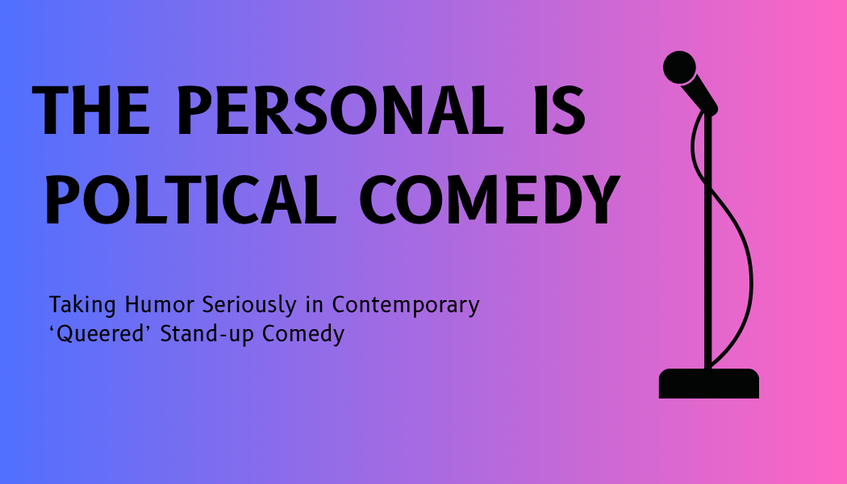The Personal is Political Comedy
Taking Humor Seriously in Contemporary "Queered" Stand-up Comedy

Taking Humor Seriously in Contemporary "Queered" Stand-up Comedy
ÖAW Doc | PL: Assoc.Prof. Julia Lajta-Novak, PI: Christina Mattson, MA | 2025-2028
Project description
Project description
Stand-up comedy, recently declared the “hallmark of Western culture” (see Kawalec), is a popular and influential form, whose prominence stems in some ways from its liminality: beyond entertainment, stand-up comedians are often called upon to articulate and make sense of the world for their audiences. Some scholars view the genre as by nature a form of social criticism (Meier and Schmitt xxv; Quirk 5; Yaross Lee xvii), but this criticism is enacted within a framework that conventionally prioritizes humor above all else, which can at times negate the criticism’s potency; as Henri Bergson explains, humor demands a “momentary anaesthesia of the heart” (Bergson 11). For all its subversive potential, stand-up has long rested on conventions and traditions that perpetuate uncomfortable contradictions.
That is beginning to change, as a recent wave of stand-up comedians is responding to these tensions and contradictions in new and innovative ways. These comedians—among them Hannah Gadsby, Tig Notaro, Cameron Esposito, Moses Storm, Joel Kim Booster, and Jerrod Carmichael—are engaged in a project of blurring boundaries and disrupting conventions of stand-up. Taken together, patterns appear throughout their work: their performances, which often take the form of stand-up comedy “specials” (long-form recorded performances filmed and edited for broadcast or digital release), are frequently formally innovative and meta-referential, directly probing at the place of humor within stand-up. Their content often focuses on experiences of marginalized and non-normative identities and sexualities, without shying away from taboo or traumatic elements; political arguments are framed through and illuminated by personal narratives.
"The Personal is Political Comedy" is the first to extended study investigate these specials as a distinct and significant trend arising within the contemporary stand-up comedy landscape, termed “queered stand-up” (Mattson) for its project of disruption and ambivalences. It examines the ways in which key examples of this trend queer the format of stand-up comedy, with regard to both disruption of conventions and embodiment of new rhetorical and formal possibilities, and explores the intriguing possibilities queered stand-up offers as an art form, particularly in responding to comedian’s goals and needs beyond humor.
Scientific Team
Project Leader: Assoz. Prof. Mag. Dr. Julia Lajta-Novak
Principal Investigator: Christina Mattson, MA.
References
Bergson, Henri. Laughter: An Essay on the Meaning of the Comic. Trans. Cloudesley Brereton and Fred Rothwell. Auckland, NZ: The Floating Press, 2008.
Kawalec, Anna. “Stand-up Comedy as a Hallmark of Western Culture.” Journal of Aesthetics and Culture 12 (2020): 2-11.
Meier, Matthew R. and Casey R. Schmitt. “Introduction.” Standing Up, Speaking Out: Stand-up Comedy and the Rhetoric of Social Change. Ed. Matthew R. Meier and Casey R. Schmitt. New York: Routledge, 2016. xxi-xxxii.
Quirk, Sophie. Why Stand-up Matters: How Comedians Manipulate and Influence. London: Bloomsbury Methuen Drama, 2015.
Yaross Lee, Judith. “Foreword: Stand-up Comedy, Social Change, and (American) Culture.” Standing Up, Speaking Out: Stand-up Comedy and the Rhetoric of Social Change. Ed. Matthew R. Meier and Casey R. Schmitt. New York: Routledge, 2016. xv-xx.


